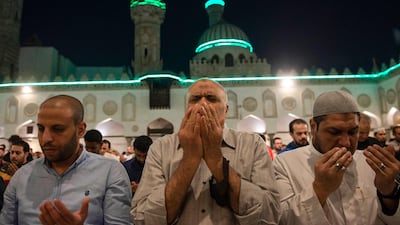Seclusion inside mosques, a religious custom during Ramadan, will be allowed at Egyptian mosques for the first time since 2020, when it was halted as part of Covid-19 measures.
Long-form taraweeh prayers, a more common Ramadan practice, will also be allowed without any time constraints this year.
Taraweeh prayers were cancelled in 2020, but allowed to resume in 2021 and 2022 with their duration shortened to less than 30 minutes.
The length of taraweeh prayers will be determined by the attending imam. Prayer times vary because different imams recite different parts of the Quran, some much longer than others, and the prayers can go on for hours.
Many Egyptians ignored official coronavirus measures in 2021 and 2022, continuing to hold taraweeh prayers on a large scale outside mosques shuttered by the Ministry of Religious Endowments.
Ramadan is a time when Cairo’s historic Islamic quarter comes to life, with millions of Sunni Muslims visiting the many shrines in the area, including those holding the remains of Al Hussein, Prophet Mohammed’s grandson and Sayeda Zainab, Al Hussein’s sister.
Taraweeh prayers will also be filmed this year, Religious Endowments Minister Mohamed Gomaa said, and the ministry would broadcast them live on its dedicated channels.
Mr Gomaa was speaking at Sunday's launch of the 29th Holy Quran Contest, a reciting competition which this year will be contested by 108 reciters from 58 countries.
The winner will receive a prize of 250,000 Egyptian pounds ($8,300).
Ramadan is expected to start on March 23, according to the Emirates Astronomical Society and Egypt's Dar Al Ifta.


